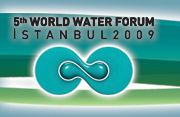On 16 to 22 March 2009, Istanbul is hosting the 5th World Water Forum under the title “Bridging Divides for Water”.
 In this context, it is interesting to look at how Istanbul is "bridging divides".
In this context, it is interesting to look at how Istanbul is "bridging divides".
Settlements and reservoirs "united"
First of all, the drinking water for the rich and poor of Istanbul comes from reservoirs which are fed by surface water sources. The areas of these water sources have been “united” with unscrupulous construction of buildings.
Luxury estates for the selected wealthy are mushrooming very close to the protected areas of the reservoirs, while a bit further away, a blind eye has been turned to the poor building their homes. The latter are then used for votes during election times.
With miscellaneous changes in rules and regulations, the illegal buildings suddenly attain legal status, despite the fact that they seriously damage the environment and pollute the water.
The areas were the settlements of the rich are ignored:
- Villas in Çekmeköy, on the northeastern outskirts of Istanbul, which were built in a definite protection zone of a river feding the Elmalı Reservoir
- The “Seferusta Farm Houses” built by Ömerli Joint Stock Company on the Ömerli Reservoir, again on the northeastern outskirts of Istanbul
- The “Alkent” estate built by Alarko on the Büyükçekmece Reservoir, on the western outskirts of Istanbul
- The Durusu Park homes built on the Terkos Reservoir in the rural western part of Istanbul province
The poor have settled in large districts built too close to the reservoirs:
- Dudullu near the Elmalı Reservoir
- Samandra, Yenidoğan, Paşaköy, Sultanbeyli and Alemdağ near the Ömerli Reservoir
- Gaziosmanpaşa, Arnavutköy, Taşoluk, Haraççı near the Sazlıdere Reservoir on the western outskirts of Istanbul
- Göktürk and Boğazköy areas near the Alibey Reservoir to the northwest of the city
In addition to these settlements, there are also small and medium-sized industrial sites, stone quarries, as well as living areas for all the workers who are employed there.
 Rich and poor "united" in paying same price
Rich and poor "united" in paying same price
When a contract for domestic water supplies is signed, the same price is paid by poor and rich, regardless what the water is used for: for washing dishes and clothes, or for filling the private pool in the garden and watering lawns.
Rich and poor are thus “united” in their payments for water.
Water being turned into commodity
Most of the people in Istanbul cannot or will not drink the water coming from the taps. In recent years companies selling plastic barrels of water to the middle and upper classes, the poor make do with traipsing to public fountains to fill containers. The content of the water in these fountains is unknown.
Although access to water is a basic human right, it has been turned into a commodity which the rich consume at the expense of the poor.
We could certainly add to the examples of how Istanbul, the host of the 5th World Water Forum, “bridges divides”. It is essential to realise what global capitalism is trying to do and to prevent the merchandise of water. (NT/EK/AG)








